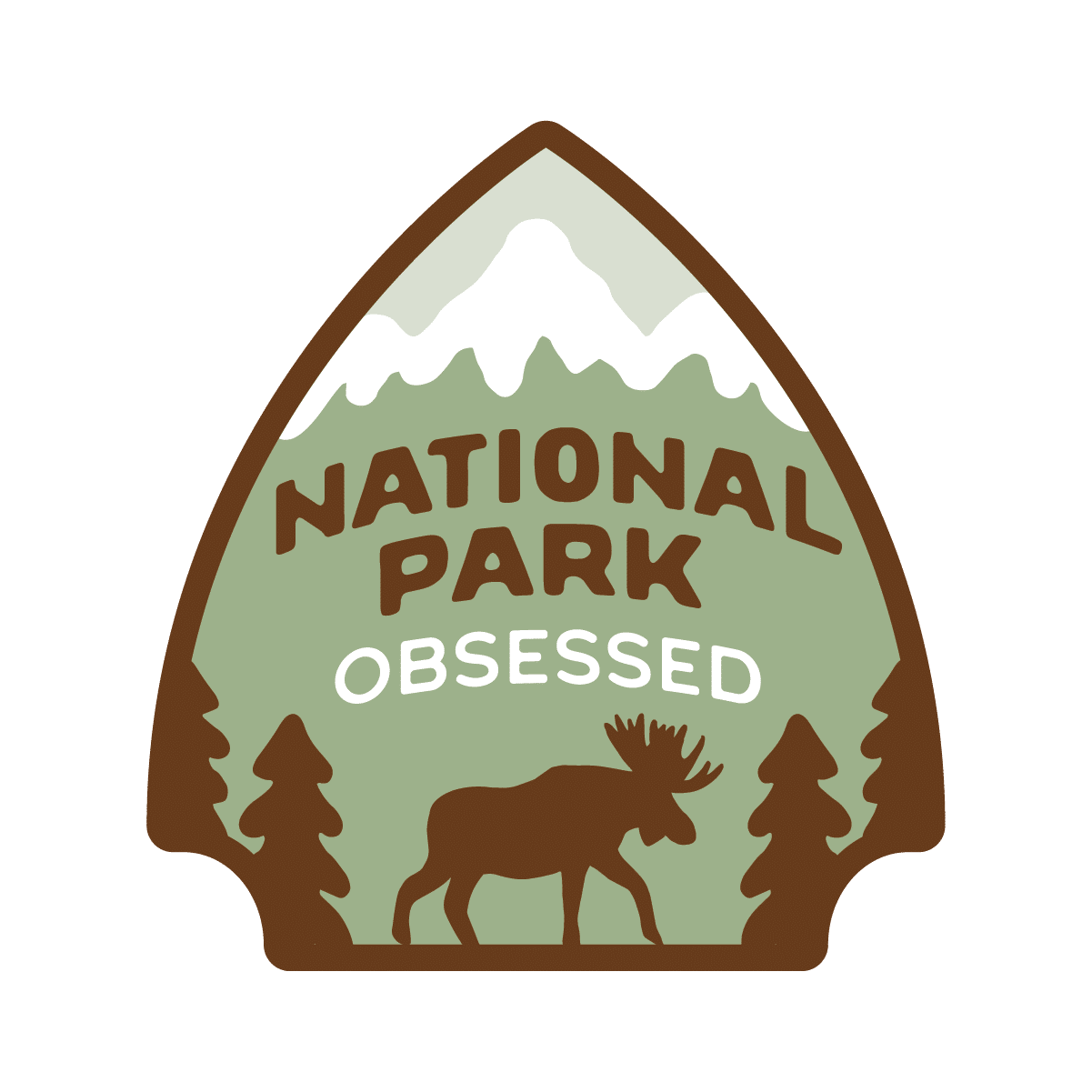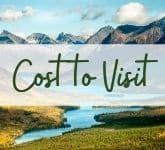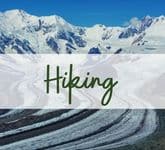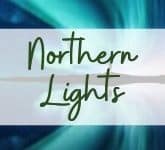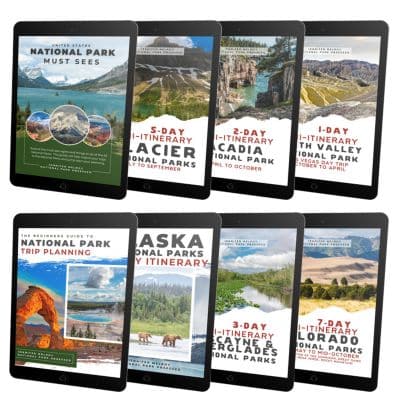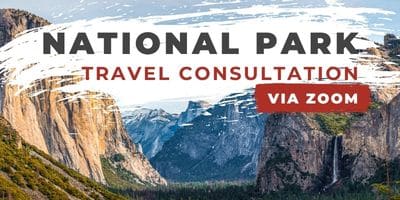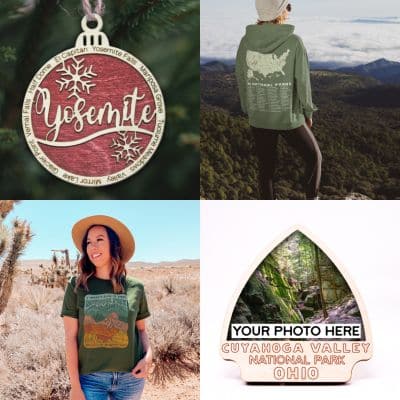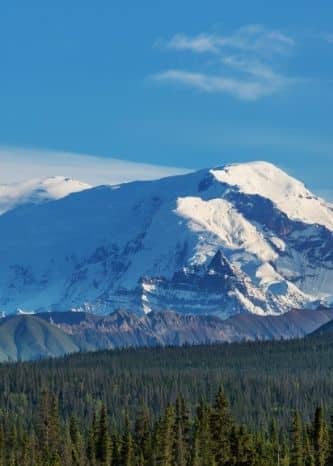
Visiting Wrangell – St. Elias National Park and Preserve: The Complete Guide for 2022
- Jennifer Melroy
- Last Modified January 26, 2024
- First Published on October 31, 2020
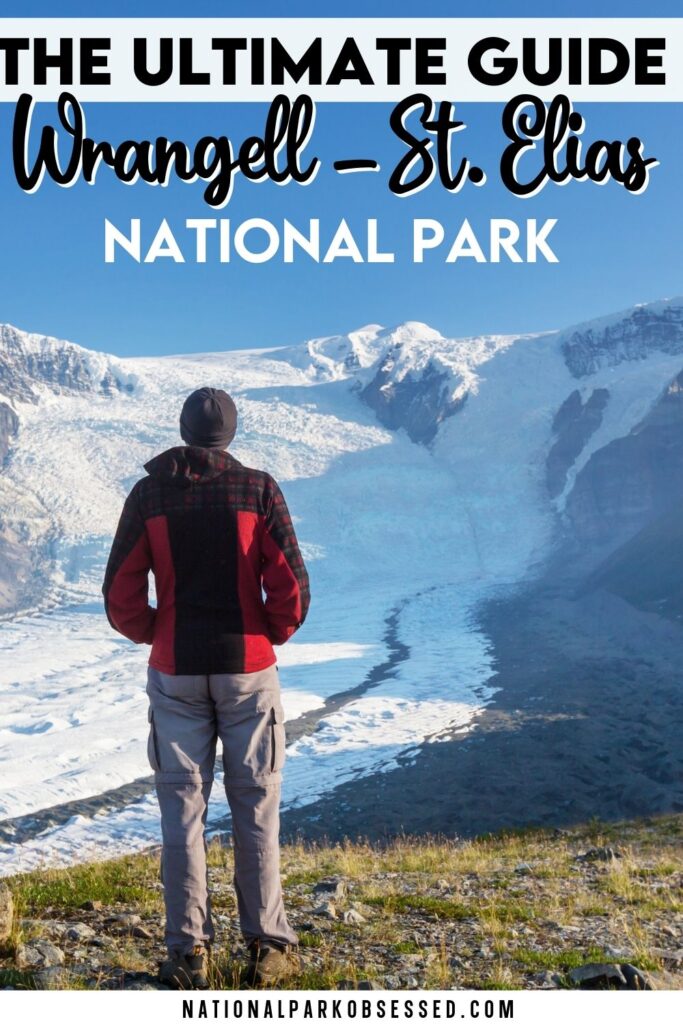
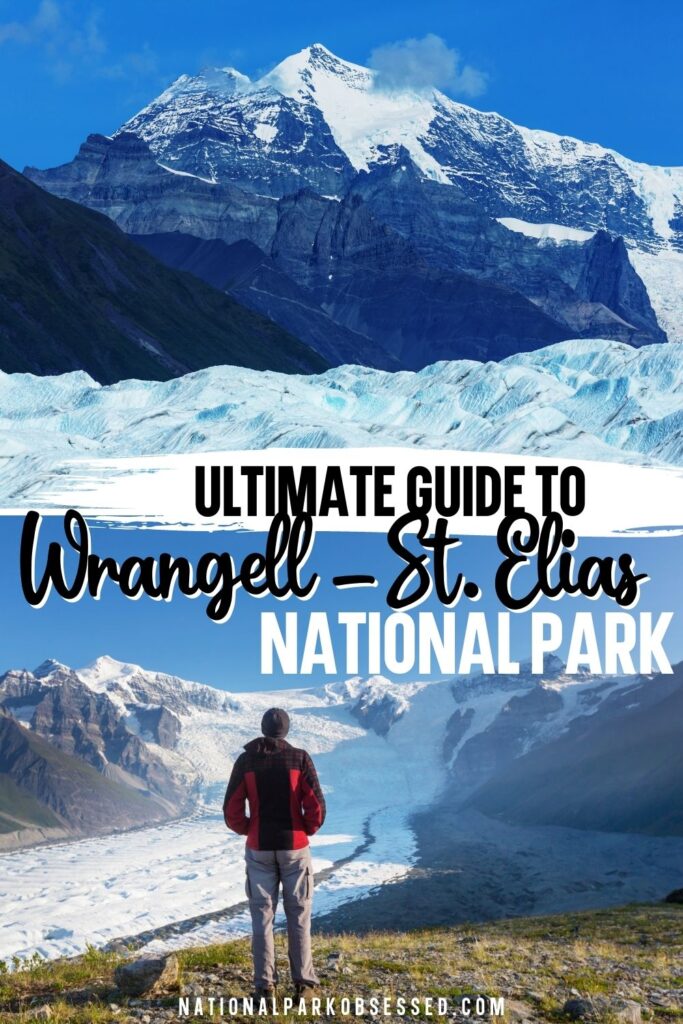
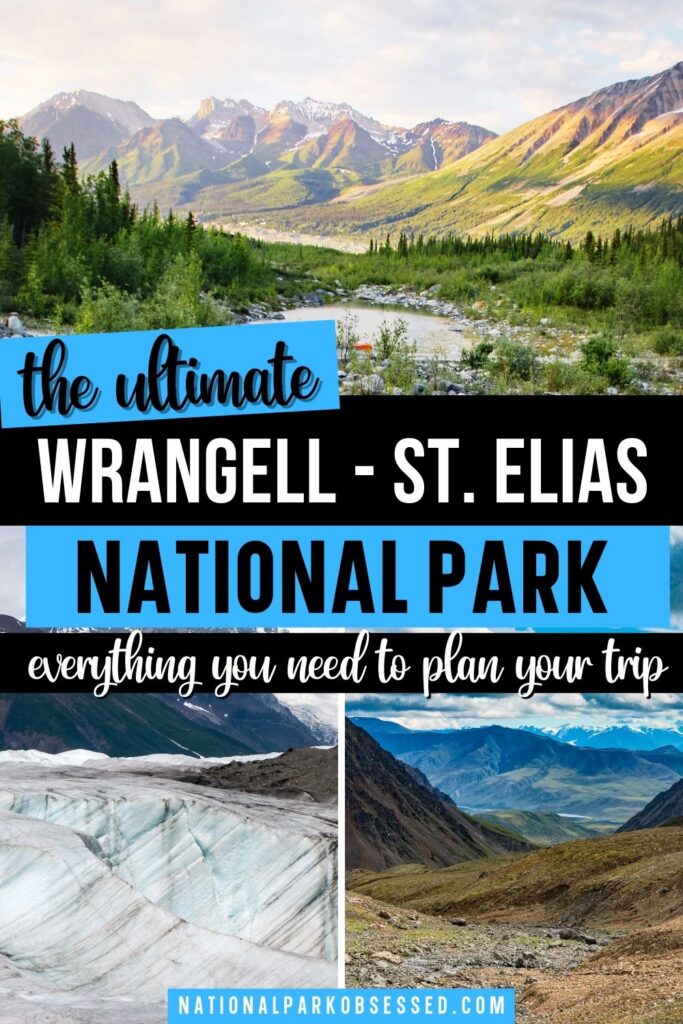
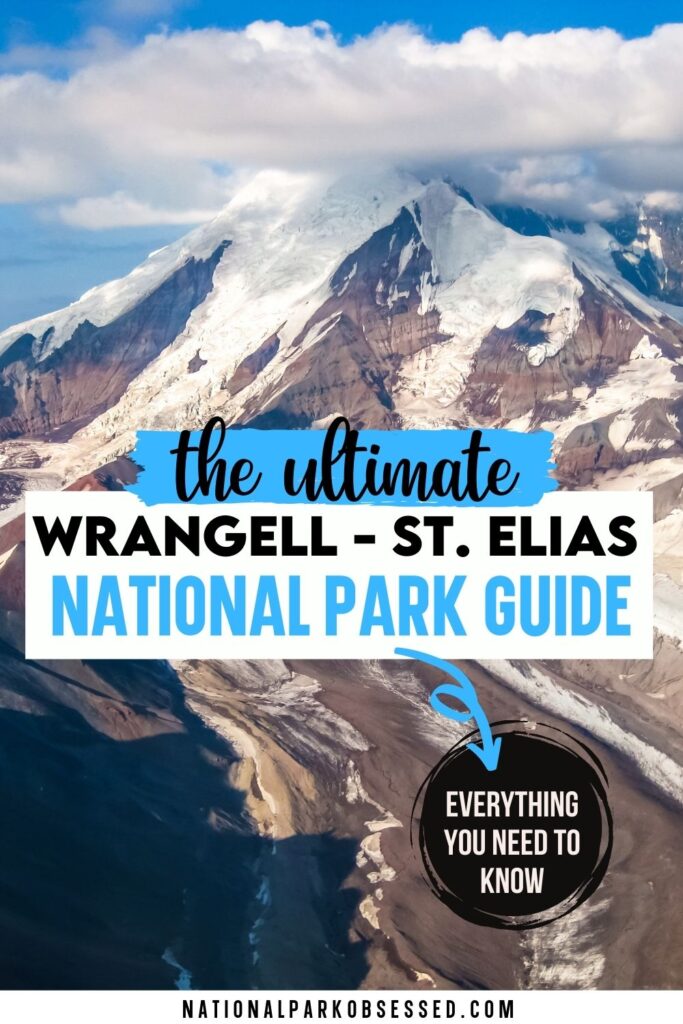
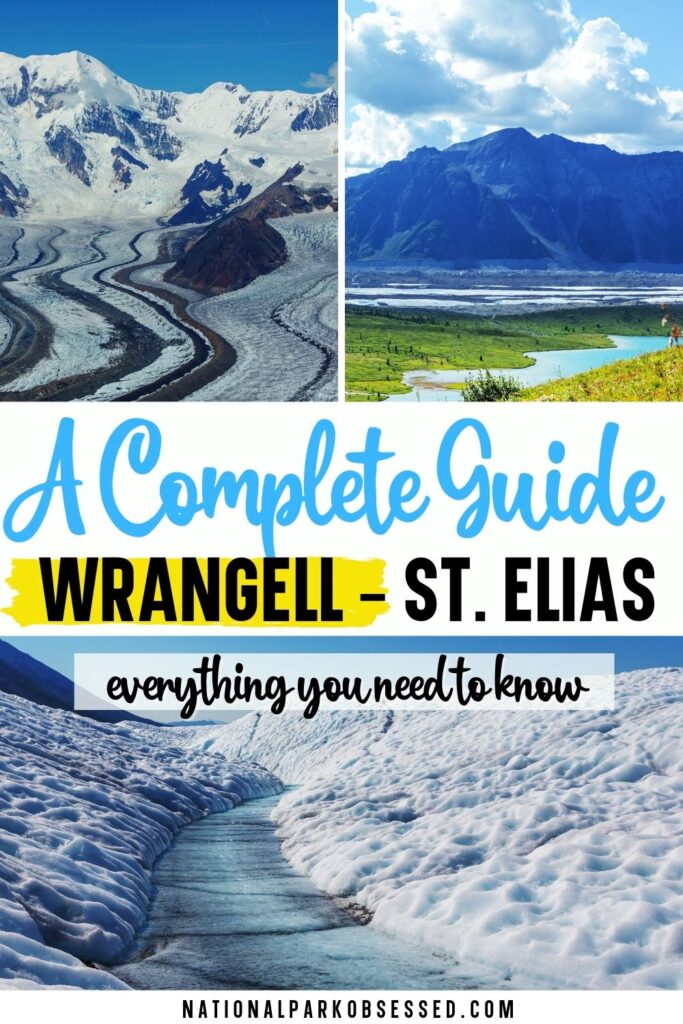
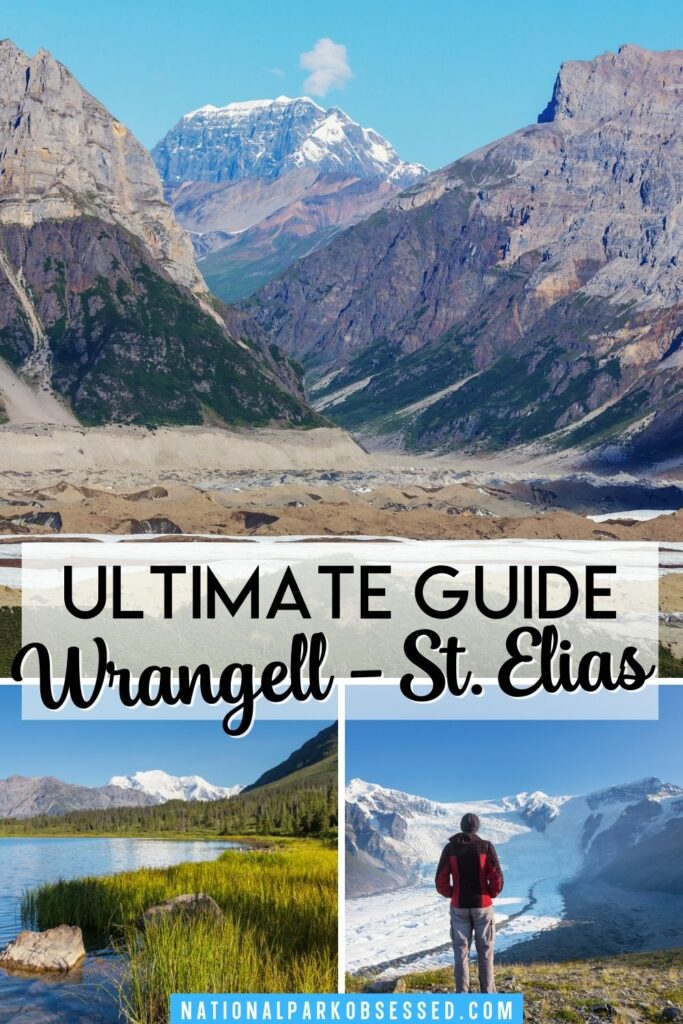

Post Summary: Visiting Wrangell – St. Elias National Park
If you are planning a trip to Wrangell – St. Elias National Park and need some help planning your trip, this is our started guide for visiting Wrangell – St. Elias National Park and Preserve. We often have detailed in-depth guides reached to Wrangell – St. Elias National Park trip planning and will link to these where appropriate to make your trip planning as easy as possible.
If you are feeling overwhelmed with trip planning and would like a national park expert to help plan your trip, we offer a Custom National Park Itinerary Planning Service. Fill out a simple questionnaire and let us do the planning for you.
This post may contain affiliate links, meaning if you book or buy something through one of these links, I may earn a small commission at no extra cost to you! Read the full disclosure policy here

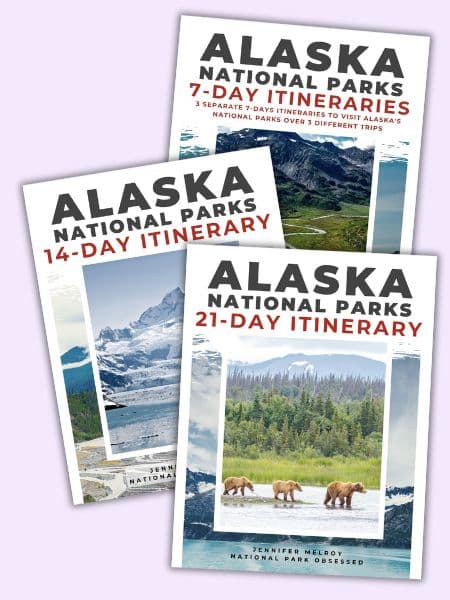
Does Alaska Trip Planning Leave You Feeling Overwhelmed?
Jump right into booking your Alaska National Parks trip with our expertly designed, pre-made, downloadable National Park itineraries.
The Quick Guide to Visiting Wrangell – St. Elias National Park and Preserve
Map of Wrangell – St. Elias National Park and Preserve
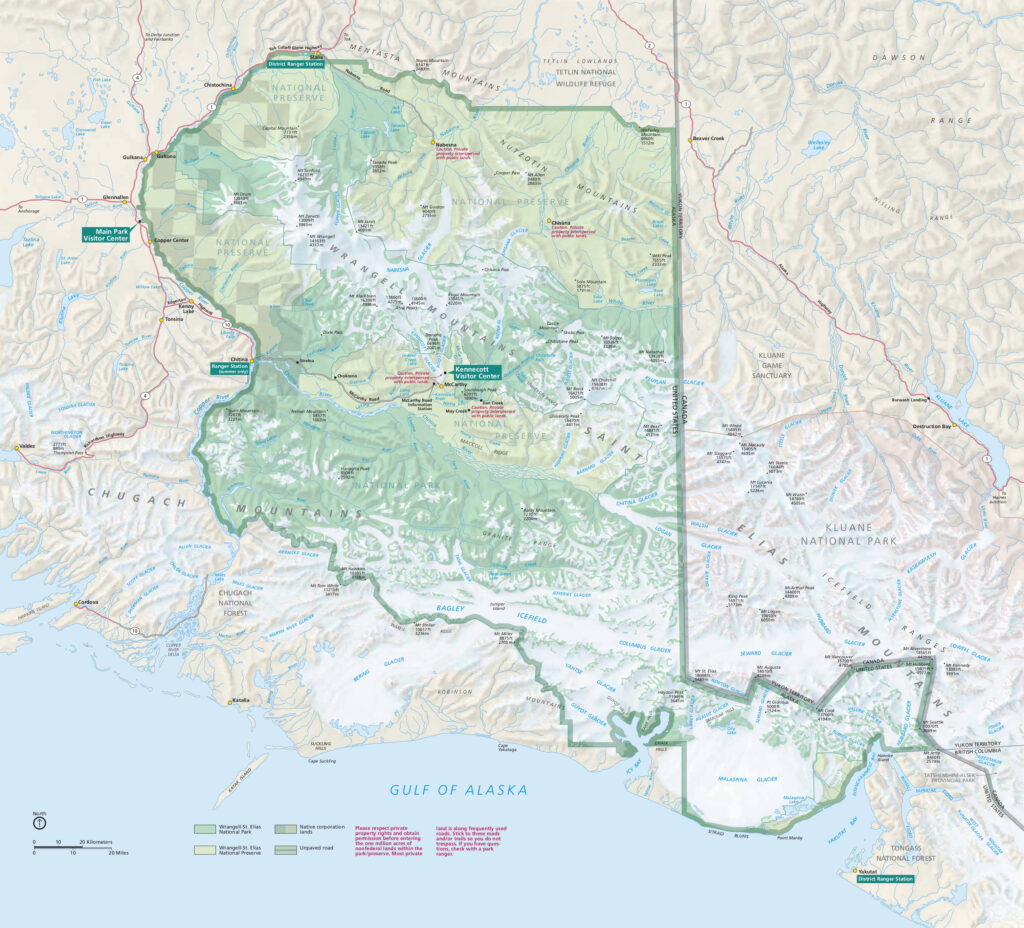
Click on the Wrangell – St. Elias Map above to download the official brochure map. If you’d like a PDF copy of this Wrangell – St. Elias Map click here.
Wrangell – St. Elias National Park and Preserve Basics
Region: Alaska / West Coast / Pacific / Pacific Northwest
Region: State of Alaska
Total Size: 13,175,791 acres (20,587 sq miles) (53,321 sq km)
Park Size: 8,323,146 acres (13,005 sq miles) (33,683 sq km)
Preserve Size: 4,852,645 acres (7,582 sq miles) (19,638 sq km)
Location: Valdez–Cordova Census Area, Yakutat City and Borough, and Southeast Fairbanks Census Area
Closest Cities: Copper Center, Alaska
Busy Season: June to August
Visitation: 74,518 (in 2019)
Official Website: NPS.gov
How much does Wrangell – St. Elias National Park and Preserve Cost?
Wrangell – St. Elias National Park does not charge an entrance fee.
When is Wrangell – St. Elias National Park and Preserve Open?
Wrangell – St. Elias National Park and Preserve is open year-round, but some park roads close for winter.
Are dogs allowed in Wrangell – St. Elias National Park and Preserve?
Yes, pets are welcome in Wrangell – St. Elias National Park and Preserve and allowed in the backcountry as long as they are properly controlled. From Spring to Fall, trapping is allowed, please take care to keep control of your dog so they don’t get caught in a snare. Please review the Wrangell – St. Elias Pet Policy before bringing your dog to Wrangell – St. Elias.
Where are Wrangell – St. Elias National Park and Preserve’s visitor centers?
Copper Center Visitor Center Complex – Open Year Round
Slana Ranger Station – May to September
Chitina Ranger Station – May to September
McCarthy Road Information Station – Open Year Round
Kennecott Visitor Center – May to September
Yakutat District Office – May to September
Land Acknowledgments for Wrangell – St. Elias National Park and Preserve
The National Park known as Wrangell – St. Elias National Park and Preserve sits on Dënéndeh, Ahtna Nenn’, Eyak, Upper Tanana, and Lingít Aaní (Tlingit) land.
Thank you to the Native Land Digital for making the Indigenous territories accessible to all. They have mapped the known territories to the best of the current knowledge and is a work in progress. If you have additional information on the Indigenous nations boundaries, please let them know.
Native Land Digital is a registered Canadian not-for-profit organization with the goal to creates spaces where non-Indigenous people can be invited and challenged to learn more about the lands they inhabit, the history of those lands, and how to actively be part of a better future going forward together.

Does Alaska Trip Planning Leave You Feeling Overwhelmed?
Jump right into booking your Alaska National Parks trip with our expertly designed, pre-made, downloadable National Park itineraries.
When was Wrangell – St. Elias National Park Created?
The human history of Wrangell – St. Elias National Parks dates back to 1,000 A.D. Small groups of the Ahtna people settled along the Copper River while the Upper Tanana people steeled along the Nabesna and Chisana Rivers. The Eyak people settled along the Copper River delta and the Tlingit people were disprised along the coastline.
The first recorded European visitors were Russian explorers. Vitus Bering visited the area in 1741 and a permeant settlement was estableished in 1793 at Port Etches on Hinchinbrook Island. A second settlement was founded in 1976 at Yakutat Bay. When the Russian noticed that the Indigenous people were using copper tools, they started looking for copper deposits. This increased tensions and there were several conflicts by Russian and Indigenous people.
Exploration of the area was minimal the 1880’s when the Yukon Gold Rush. Amerians started exploring looking for gold and copper. Deposits of copper was found in Kennecott in the early 1900’s and a mining area began and a railway was built to connect the mine to the coast and existing Alaska infrastructure. Mining peaked around the 1920’s and most mines had closed by the 1940’s.
In 1939, Ernest Gruening, Director of the Division of Territories and Island Possessions in the Department of the Interior and later Alaska Territory governor, pushed for the creation of a National Park of the Chitina Valley along with a National Monument to proetect the Kennicott Glacier and mine site. Protecting the area was a prority giving the looming war. In 1942, Canada pushed for St. Elias Mountains International Park to protect the mountains on both side of the border (and would include the then Glacer Bay National Monument). The idea didn’t move forward.
After the war, plans to create and expaned the park system in Alaska gained steam. Due to some Alaskan opposition and delays in passing the Alaska Native Claims Settlement Act (ANILCA), Wrangell – St. Elias National Monument was establisehd by Jimmy Carter on December 1, 1978. On December 2, 1980, ANILCA was passed and Wrangell – St. Elias became a National Park and Preserve.
In 1979, Canada’s dream of an International Park was completed with the creation of the Kluane / Wrangell–St. Elias / Glacier Bay / Tatshenshini-Alsek UNESCO World Heritage Site.
The purpose of Wrangell-St. Elias National Park and Preserve is to maintain the natural scenic beauty of the diverse geologic, glacial, and riparian dominated landscapes, and to protect the attendant wildlife populations and their habitats; to ensure continued access for a wide range of wilderness-based recreational opportunities; to provide continued opportunities for subsistence use.
Wrangell – St. Elias National Park Foundation Document
Fun Facts about Wrangell – St. Elias National Park
- The highest point in Wrangell – St. Elias National Park is Mount Saint Elias which is 18,008 feet (5,489 m) above sea level. The mountain is the second highest peak in North America.
- The lowest point in Wrangell – St. Elias National Park is the Gulf of Alaska at 0 feet (0 m).
- Wrangell – St. Elias National Park is the largest National Park in the United States. The park is SIX times the size of the Yellowstone.
- Wrangell – St. Elias National Park is the largest single wilderness area in the US.
- Wrangell’s Malaspina Glacier is the largest piedmont glacier in the world, with a surface area of over 1,500 square miles
- Despite its size, Wrangell only has two roads.
How Much Time Should I Spend Visiting Wrangell – St. Elias National Park?
One Day in Wrangell – St. Elias National Park
If you only have one day in Wrangell – St. Elias, make the most of it and plan to come back at some point. If you are spending the your one day in Wrangell along the McCarthy Road, drive out to McCarthy and then hike to Root Glacier and do a mine tour.
If you are along the Nabesna Road, drive out to Nabesna and do some hiking.
Multiple Days in Wrangell – St. Elias National Park
If you have muliple days in Wrangell – St. Elias consider doing a rafting trip or hike out on to the glacier.
Cruise Ship Visit to Wrangell-St. Elias National Park
Some Alaska Crusies include a sort stop in Wrangell-St. Elias National Park. The ships typically enter Yakutat and Disenchamiment Bay and travel up the bays to Hubbard Glacier. Hubbard Glacier is inside the park boundaries but the park boundaries end at the shoreline so you aren’t actually inside the park.
It is YOUR choice on if a curise ship stop at Hubbard Glacier counts as a visit to Wrangell-St. Elias. Just remember that this is a 13 MILLION acre National Park. If you decide the count the Hubbard Glacier visit, I recommend putting Wrangell on the top of revisit list since you saw a TINY fraction of the park.
Related: 13 Things I Wish I’d Known Before Trying To Visiting All The National Parks
Things to do in Wrangell – St. Elias National Park
Hiking in Wrangell – St. Elias National Park
Like most Alaska National Parks, Wrangell – St. Elias National Park has a limited number of maintained hiking trails.
If you are along the McCarthy Road consider hiking:
- Jumbo Mine Trail – 10 miles
- Root Glacier – 5.7 miles
- West Kennecott Glacier Trail – 2.4 miles
If you are along the Nabesna Road consider hiking:
- Rambler Mine Trail – 1.6 miles
- Lost Creek Trail – 7 miles
- Skookum Volcano Trail – 4.2 miles
Learn more about the best hikes in Wrangell – St. Elias National Park
Where to stamp your National Parks Passport Book in Wrangell-St. Elias National Park?
The National Park Passport Book is the BEST and cheapest National Park souvenir. Every National Park Obsessed person should have one of these books.
If you are new to the National Parks, you can learn more about the National Parks Passport program here or jump right in by ordering:
- The ever-popular Classic National Parks Passport
- Get 15% Off Your Next Order at the America’s National Parks Online Store with Code: NATIONALPARKOBSESSED at Checkout
- Or get the National Park Obsessed’s National Park Passport & Journal
IMPORTANT: Do NOT stamp your government-issued passport.
There are 13 official stamps for Wrangell-St. Elias National Park. Here is the list of National Park Passport Stamps you can get in Wrangell-St. Elias National Park:
- Chitina, AK (Nat’l Park & Preserve)
- Chitina, AK (No Dash)
- Chitina, AK (NP & PRES)
- Cooper Center, AK (Cooper should be Copper)
- Copper Center, AK (Nat’l Park & Preserve)
- Copper Center, AK (National Park & Preserve) V1
- Copper Center, AK (National Park & Preserve) V2
- Hubbard Glacier – Yakutat, AK
- Kennecott, AK (National Park & Preserve)
- Kennecott, AK (NP & PRES)
- NPS Centennial
- Slana, AK
- Yakutat, AK
Bonus Stamps
- Junior Ranger
- Wrangell-St. Elias National Park & Preserve
Wrangell-St. Elias National Park Passport Stamp Locations
Here are all the locations to find the Wrangell-St. Elias National Park Passport Stamps. Not every stamp is available at every location.
- Chitina Ranger Station
- Copper Center Visitor Center
- Copper River Princess Wilderness Lodge
- Kennecott Visitor Center
- Slana Ranger Station
- Yakutat District Office
Recommend Reading for Wrangell – St. Elias National Park
Stories from Wrangell – St. Elias National Park
- Mountain Wilderness: An Illustrated History of the Wrangell-St. Elias National Park and Preserve, Alaska is an illustrated history of the park and an indepth look at hte historic area.
Best Wrangell – St. Elias National Park Guide Books
National Park Obsessed’s Detailed Guides to Wrangell – St. Elias National Park and Preserve
General Information on Visiting Wrangell – St. Elias National Park and Preserve
Wrangell – St. Elias National Park Activity Guides
Other Articles featuring Wrangell – St. Elias National Park and Preserve

Does Alaska Trip Planning Leave You Feeling Overwhelmed?
Jump right into booking your Alaska National Parks trip with our expertly designed, pre-made, downloadable National Park itineraries.
Frequently Asked Questions about Wrangell – St. Elias National Park
What is the best time of year to visit Wrangell – St. Elias National Park?
Wrangell-St. Elias is best visited from late May to early September. Outside of these months, park services are limited and the roads are not maintained.
Is Wrangell St Elias National Park worth visiting?
Yes, this is a MASSIVE National Park with 2 different mountain ranges, 1,000 glaciers, and volcanos. There is so much to see in this park.
How do I get to Wrangell St Elias National Park?
Wrangell can be reached by the Alaska road system.
Can you drive in Wrangell St Elias National Park?
Yes, but please note that the roads are gravel and most rental car companies don’t allow their vehicles on this road. If planning to drive your rental out here, double check that it is covered by your contract.
Final Thoughts on Wrangell – St. Elias National Park
Do you have any questions about Wrangell – St. Elias National Park, let us know in the comments below or need help planning your National Park trips. Let me know in the comments or join me in my National Park Trip Planning Community!
Pin for Later: Visiting Wrangell – St. Elias National Park: The Complete Guide for 2022

Jennifer Melroy
Hi, I'm Jennifer!
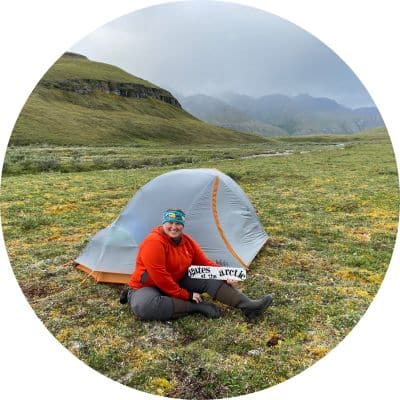
Welcome to the wonderful world of National Parks. I'm here to help you plan your NEXT amazing adventure through the United States National Parks and beyond. I want the national parks to be accessible to all.
I live in Tennessee, and when I'm home, you can find me hiking in the Smokies and the Cumberland Plateau.
58/63 National Parks
250+/423 National Park Units
Want to know more? Start Here.
ACKNOWLEDGEMENT OF LAND
On this site, we promote travel to the United States and beyond that are the traditional lands of Indigenous and First Nations peoples.
With respect, I make a formal land acknowledgment, extending my appreciation and respect to these lands’ past and present people.
To learn more about the people who call these lands home, I invite you to explore Native Land.
DISCLAIMER
National Park Obsessed assumes no responsibility or liability for any errors or omissions in the content of this site (NationalParkObsessed.com). The information contained in this site is provided with no guarantees of completeness, accuracy, usefulness or timeliness. You are encouraged to conduct your own due diligence before acting on the information provided on this site and should not rely on the opinions expressed here.
There is an inherent risk in all outdoor recreation activities, the reader assumes all responsibility for their own personal safety.
DISCLOSURE
We are a participant in the Amazon Services LLC Associates Program, an affiliate program designed to provide a means for us to earn fees by linking to Amazon.com and affiliated sites.
Privacy Policy • About Us • Contact
Select stock photography provided depositphotos
Copyright ©2023 National Park Obsessed, LLC
Privacy Overview
Last Updated on 26 Jan 2024 by Jennifer Melroy
